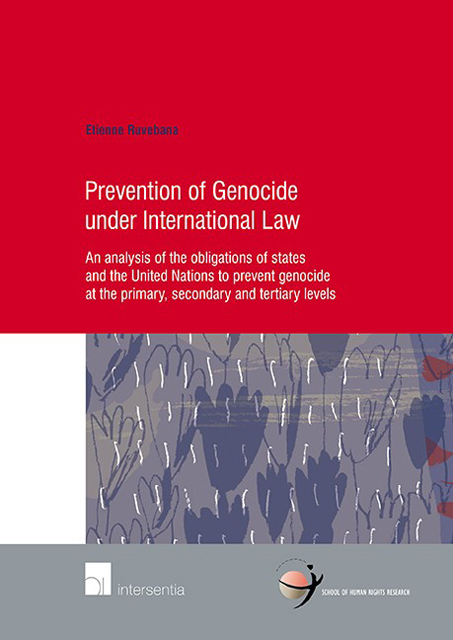 Prevention of Genocide Under International Law
Prevention of Genocide Under International Law Published online by Cambridge University Press: 24 November 2022
INTRODUCTION
This chapter will address the question what the obligation to prevent genocide means to non-territorial states. Are they obligated to prevent genocide in territorial states? If so, from what moment are they entitled and/or required to do so? What is the impact of the geographic distance on prevention and what measures can the non-territorial states legally take?
This chapter first discusses the territorial scope of the obligation to prevent genocide (section one) and the capacity of non-territorial states to prevent genocide outside their territories (section two). Regardless of the conclusions in these sections, the three other sections will examine what international law permits and/or requires to non-territorial states to prevent genocide at the primary level (section 3), the secondary level (section 4) and at the tertiary level (section 5). The infl uence as one of the available means of non-territorial states to prevent genocide at all levels is also discussed (section 6). The final section (7) discusses the issue of coordination of the prevention of genocide at all levels. Except for section one and seven, for other sections the discussion will include an examination of the capacity of those non-territorial states to prevent genocide outside their territories.
THE TERRITORIAL SCOPE OF THE OBLIGATION TO PREVENT GENOCIDE
This section first confronts the obligation to prevent genocide with the principle of state sovereignty. It also discusses the ICJ ruling on the territorial scope of the obligation to prevent genocide. In both subsections, the aim is to answer the question whether state sovereignty may (not) constitute a barrier to the prevention of genocide by non-territorial states.
Confronting the obligation to prevent genocide with state sovereignty
Sovereignty is considered as one of the central pillars of international law. Numerous scholars have written about its origin and scope. Apparently, there is no disagreement on the fact that the present foundations of international law with regard to sovereignty were shaped by agreements concluded by European states as part of the Treaty of Westphalia in 1648. After almost 30 years of war, the supremacy of the sovereign authority of the state was established within a system of independent and equal units, as a way of establishing peace and order in Europe.
To save this book to your Kindle, first ensure [email protected] is added to your Approved Personal Document E-mail List under your Personal Document Settings on the Manage Your Content and Devices page of your Amazon account. Then enter the ‘name’ part of your Kindle email address below. Find out more about saving to your Kindle.
Note you can select to save to either the @free.kindle.com or @kindle.com variations. ‘@free.kindle.com’ emails are free but can only be saved to your device when it is connected to wi-fi. ‘@kindle.com’ emails can be delivered even when you are not connected to wi-fi, but note that service fees apply.
Find out more about the Kindle Personal Document Service.
To save content items to your account, please confirm that you agree to abide by our usage policies. If this is the first time you use this feature, you will be asked to authorise Cambridge Core to connect with your account. Find out more about saving content to Dropbox.
To save content items to your account, please confirm that you agree to abide by our usage policies. If this is the first time you use this feature, you will be asked to authorise Cambridge Core to connect with your account. Find out more about saving content to Google Drive.